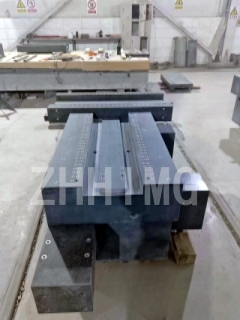Precision granite is a crucial component for the semiconductor and solar industries. It is primarily used as a foundation for precision measurement tools and machines, providing a stable surface for accurate measurements. The quality of the granite affects the precision of the measurement tools, and therefore, the accuracy of the products. To ensure the highest quality, precision granite must meet certain requirements and be maintained in a specific environment.
Requirements of Precision Granite in Semiconductor and Solar Industries
1. Flatness: Precision granite must have a high degree of flatness to ensure that it provides a stable surface for measurement tools. A flat surface reduces errors in measurements and increases the accuracy of the resulting products.
2. Stability: Precision granite must be stable and not deform under load. Stability is essential for ensuring that measurements are accurate and consistent.
3. Hardness: Precision granite must be hard enough to resist wear and tear and remain unscratched even after prolonged use. The granite must be able to withstand the physical stress from the tools and machines used for measurements.
4. Thermal Stability: Precision granite must have good thermal stability to minimize thermal expansion and contraction, which can affect the accuracy of measurements. Thermal stability is essential for precision measurements in the semiconductor and solar industries.
5. Chemical Stability: Precision granite must be chemically stable and highly resistant to corrosion. Allowing the surface to corrode can lead to roughening, loss of flatness, and degradation of the surface quality.
How to maintain the working environment for Precision Granite in Semiconductor and Solar Industries
The working environment for precision granite must be controlled to ensure that it meets the requirements stated above. Below are some factors to be considered when maintaining a suitable environment:
1. Temperature Control: Granite tends to expand and contract with temperature changes. Therefore, the working environment for precision granite must be temperature-controlled to maintain steady temperature and minimize temperature changes. This could be achieved using air conditioning or insulation.
2. Humidity Control: High humidity levels can lead to corrosion and damage of the granite surface. Therefore, humidity levels should be kept below 60% to ensure optimal performance.
3. Cleanliness Control: The working environment must be clean to prevent dust and other particles from settling on the granite surface, which can affect its flatness. A cleanroom environment is highly recommended.
4. Vibration Control: Vibrations can deform the granite and affect its flatness, which would have a significant impact on the accuracy of measurements. Therefore, vibration control measures should be implemented in the working environment.
5. Lighting Control: Harsh lighting conditions can cause thermal expansion and contraction of precision granite, affecting its accuracy. Therefore, lighting conditions should be controlled to create a suitable environment for precision granite.
In conclusion, precision granite is a critical component for the semiconductor and solar industries. As such, the environment in which it operates must be controlled to meet the requirements stated above. By following the guidelines provided, the accuracy and precision of measurements could be significantly improved, thus leading to better quality products.
Post time: Jan-11-2024

